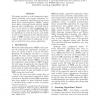21 search results - page 2 / 5 » Knowledge-Rich Word Sense Disambiguation Rivaling Supervised... |
AAAI
2006
13 years 9 months ago
2006
We present an extensible supervised Target-Word Sense Disambiguation system that leverages upon GATE (General Architecture for Text Engineering), NSP (Ngram Statistics Package) an...
ACL
2004
13 years 9 months ago
2004
Supervised learning methods for WSD yield better performance than unsupervised methods. Yet the availability of clean training data for the former is still a severe challenge. In ...
CORR
2000
Springer
13 years 7 months ago
2000
Springer
This paper describes a set of comparative experiments, including cross{corpus evaluation, between ve alternative algorithms for supervised Word Sense Disambiguation (WSD), namely ...
CORR
2004
Springer
13 years 7 months ago
2004
Springer
This paper describes the National Research Council (NRC) Word Sense Disambiguation (WSD) system, as applied to the English Lexical Sample (ELS) task in Senseval-3. The NRC system ...
COLING
2008
13 years 9 months ago
2008
We propose a supervised word sense disambiguation (WSD) method using tree-structured conditional random fields (TCRFs). By applying TCRFs to a sentence described as a dependency t...

